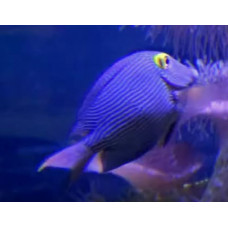Latin name
Ctenochaetus cyanocheilus
Other name
Yelloweye bristletooth, goldring bristletooth, Indo-Pacific yellow tang, short-tail bristle-tooth.
Identification
Ctenochaetus cyanocheilus has the species name cyanocheilus, which means "blue lips", which this fish displays when alive.
Features of fish fins
The dorsal fin rests on 8 spines and 25 to 28 soft rays, the anal fin rests on 3 spines and 22 to 26 soft rays. The caudal fin is pointed.
Fish colouring
Overall coloration is orange to brown with a bluish spot on the thorax and thin gray-blue horizontal lines along the body. There are numerous small yellow patches on the head and front of the body. There is a thin yellow ring around the eyes and the snout ends in blue lips. The dorsal and anal fins are brown, and the dorsal fin has blue lines extending away from the body. Juveniles are yellow.
Distribution
Widespread in the western Pacific from Sumatra and peninsular Malaysia eastward to American Samoa and the Line Islands, northward to the Japanese Ogasawara Islands, and southward to New Caledonia, Tonga, and the Great Barrier Reef.
Habitat
A marine tropical species. Found at depths of 1 to 60 m (3 ft 3 in and 196 ft 10 in) in areas of dense coral cover on inner and outer reefs.
Size
The maximum published standard length of this species is 16 cm (6.3 in).
Behavior
These fish usually swim alone or in groups.
Food and feeding habits
They feed on algae.
Reproduction
During the mating season, males perform amusing courtship rituals. They display their sharp scalpels to females, dance, and try to attract attention with bright colors.
Fishing
Have negligible commercial value in the fishery.
Relationship with a person
A species not harmful to humans. Used in aquaristics.
| Classification | |
| Phylum | Chordata |
| Class | Actinopterygii |
| Squad | Acanthuriformes |
| Family | Acanthuridae |
| Genus | Ctenochaetus |
| Species | C. cyanocheilus |
| Features | |
| Conservation status | Least Concern |
| Habitat | Pelagic |
| Life span, years | No information |
| Maximum body weight, kg | No information |
| Maximum length, cm | 16 |
| Sailing speed, m/s | No information |
| Threat to people | Not edible |
| Way of eating | Bentophage |
Bluelip bristletooth
Tags: bluelip bristletooth


